Allen-Bradley ControlLogix 1756-IH16ISOE Installation Instructions Manual
- Taper
- Installation Instructions Manual

Publication 1756-IN592A-EN-P - March 2004
Installation Instructions
ControlLogix 90-140V DC Sequence of Events
Input Module
Catalog Number 1756-IH16ISOE
Obtain a User Manual
This product also has a user manual (pub. no. 1756-UM528). To view
it, visit www.ab.com/manuals or www.theautomationbookstore.com.
To purchase a manual, you can:
• contact your distributor or Rockwell Automation representative
• visit www.theautomationbookstore.com
and place an order
• call 800.963.9548 (USA/Canada) or 001.320.725.1574 (outside
USA/Canada)
To: See page:
Identify the Module Components 6
Note the Power Requirements 6
Install the Module 7
Key the Module and Removable Terminal Block/Interface Module 8
Wire the Removable Terminal Block 9
Wire the 1756-IH16ISOE Module 10
Assemble the Removable Terminal Block and the Housing 11
Install the Removable Terminal Block onto the Module 11
Check the Indicators 12
Remove the Removable Terminal Block from the Module 13
Remove the Module 13
See Specifications 14
AB Drives

2 ControlLogix 90-140V DC Sequence of Events Input Module
Publication
1756-IN592A-EN-P - March 2004
Important User Information
Solid state equipment has operational characteristics differing from those of electromechanical
equipment. Safety Guidelines for the Application, Installation and Maintenance of Solid State Controls
(Publication SGI-1.1 available from your local Rockwell Automation sales office or online at
http://www.ab.com/manuals/gi) describes some important differences between solid state equipment
and hard-wired electromechanical devices. Because of this difference, and also because of the wide
variety of uses for solid state equipment, all persons responsible for applying this equipment must
satisfy themselves that each intended application of this equipment is acceptable.
In no event will Rockwell Automation, Inc. be responsible or liable for indirect or consequential damages
resulting from the use or application of this equipment.
The examples and diagrams in this manual are included solely for illustrative purposes. Because of the
many variables and requirements associated with any particular installation, Rockwell Automation, Inc.
cannot assume responsibility or liability for actual use based on the examples and diagrams.
No patent liability is assumed by Rockwell Automation, Inc. with respect to use of information, circuits,
equipment, or software described in this manual.
Reproduction of the contents of this manual, in whole or in part, without written permission of Rockwell
Automation, Inc. is prohibited.
Throughout this manual we use notes to make you aware of safety considerations.
WARNING
Identifies information about practices or circumstances that can cause an explosion in a
hazardous environment, which may lead to personal injury or death, property damage,
or economic loss.
IMPORTAN
T
Identifies information that is critical for successful application and understanding of the
product.
ATTENTION
Identifies information about practices or circumstances that can lead to personal injury
or death, property damage, or economic loss. Attentions help you:
• identify a hazard
• avoid a hazard
• recognize the consequence
SHOCK HAZAR
D
Labels may be located on or inside the drive to alert people that dangerous voltage may
be present.
BURN HAZARD
Labels may be located on or inside the drive to alert people that surfaces may be
dangerous temperatures.

ControlLogix 90-140V DC Sequence of Events Input Module 3
Publication
1756-IN592A-EN-P - March 2004
Environment and Enclosure
Prevent Electrostatic Discharge
ATTENTION
This equipment is intended for use in a Pollution Degree 2 industrial environment, in
overvoltage Category II applications (as defined in IEC publication 60664-1), at altitudes
up to 2000 meters without derating.
This equipment is considered Group 1, Class A industrial equipment according to
IEC/CISPR Publication 11. Without appropriate precautions, there may be potential
difficulties ensuring electromagnetic compatibility in other environments due to
conducted as well as radiated disturbance.
This equipment is supplied as "open type" equipment. It must be mounted within an
enclosure that is suitably designed for those specific environmental conditions that will
be present and appropriately designed to prevent personal injury resulting from
accessibility to live parts. The interior of the enclosure must be accessible only by the
use of a tool. Subsequent sections of this publication may contain additional
information regarding specific enclosure type ratings that are required to comply with
certain product safety certifications.
NOTE: See NEMA Standards publication 250 and IEC publication 60529, as applicable,
for explanations of the degrees of protection provided by different types of enclosure.
Also, see the appropriate sections in this publication, as well as the Allen-Bradley
publication 1770-4.1 ("Industrial Automation Wiring and Grounding Guidelines"), for
additional installation requirements pertaining to this equipment.
ATTENTION
This equipment is sensitive to electrostatic discharge, which can cause internal
damage and affect normal operation. Follow these guidelines when you handle this
equipment:
• Touch a grounded object to discharge potential static.
• Wear an approved grounding wriststrap.
• Do not touch connectors or pins on component boards.
• Do not touch circuit components inside the equipment.
• If available, use a static-safe workstation.
• When not in use, store the equipment in appropriate static-safe packaging.
AB Drives

4 ControlLogix 90-140V DC Sequence of Events Input Module
Publication
1756-IN592A-EN-P - March 2004
Removal and Insertion Under Power
Be sure that power is removed or the area is nonhazardous before
proceeding. Repeated electrical arcing causes excessive wear to
contacts on both the module and its mating connector. Worn contacts
may create electrical resistance that can affect module operation.
North American Hazardous Location Approval
WARNING
When you insert or remove the module while backplane
power is on, an electrical arc can occur. This could cause
an explosion in hazardous location installations.
The following information applies
when operating this equipment in
hazardous locations:
Informations sur l’utilisation de cet
équipement en environnements
dangereux:
Products marked “CL I, DIV 2, GP A, B, C,
D” are suitable for use in Class I Division 2
Groups A, B, C, D, Hazardous Locations
and nonhazardous locations only. Each
product is supplied with markings on the
rating nameplate indicating the hazardous
location temperature code. When
combining products within a system, the
most adverse temperature code (lowest
“T” number) may be used to help
determine the overall temperature code of
the system. Combinations of equipment in
your system are subject to investigation
by the local Authority Having Jurisdiction
at the time of installation.
Les produits marqués "CL I, DIV 2, GP A, B, C, D"
ne conviennent qu’à une utilisation en
environnements de Classe I Division 2 Groupes
A, B, C, D dangereux et non dangereux. Chaque
produit est livré avec des marquages sur sa
plaque d’identification qui indiquent le code de
température pour les environnements
dangereux. Lorsque plusieurs produits sont
combinés dans un système, le code de
température le plus défavorable (code de
température le plus faible) peut être utilisé pour
déterminer le code de température global du
système. Les combinaisons d’équipements
dans le système sont sujettes à inspection par
les autorités locales qualifiées au moment de
l’installation.

ControlLogix 90-140V DC Sequence of Events Input Module 5
Publication
1756-IN592A-EN-P - March 2004
WARNING
EXPLOSION HAZARD
• Do not disconnect
equipment unless
power has been
removed or the area
is known to be
nonhazardous.
• Do not disconnect
connections to this
equipment unless
power has been
removed or the area
is known to be
nonhazardous.
Secure any external
connections that
mate to this
equipment by using
screws, sliding
latches, threaded
connectors, or other
means provided
with this product.
• Substitution of
components may
impair suitability for
Class I, Division 2.
• If this product
contains batteries,
they must only be
changed in an area
known to be
nonhazardous.
AVERTISSEMENT
RISQUE D’EXPLOSION
• Couper le courant ou
s’assurer que
l’environnement est
classé non dangereux
avant de débrancher
l'équipement.
• Couper le courant ou
s'assurer que
l’environnement est
classé non dangereux
avant de débrancher
les connecteurs. Fixer
tous les connecteurs
externes reliés à cet
équipement à l'aide
de vis, loquets
coulissants,
connecteurs filetés ou
autres moyens fournis
avec ce produit.
• La substitution de
composants peut
rendre cet équipement
inadapté à une
utilisation en
environnement de
Classe I, Division 2.
• S’assurer que
l’environnement est
classé non dangereux
avant de changer les
piles.
The following information applies
when operating this equipment in
hazardous locations:
Informations sur l’utilisation de cet
équipement en environnements
dangereux:
AB Drives

6 ControlLogix 90-140V DC Sequence of Events Input Module
Publication
1756-IN592A-EN-P - March 2004
Identify the Module Components
You received the following components with your order:
• 1756-IH16ISOE module
• Removable Terminal Block (RTB) door label
• jumper bar
If you did not receive these components, contact your local
distributor Rockwell Automation sales office.
This module mounts in a 1756 chassis and uses a separately-ordered
RTB or a Bulletin 1492 Interface Module (IFM)
(1)
to connect all
field-side wiring. This module uses one of the following RTBs:
• 1756-TBCH 36 position Cage clamp RTB
• 1756-TBS6H 36 position Spring clamp RTB
Use an extended-depth cover (1756-TBE) for applications with heavy
gauge wiring or requiring additional routing space. When using an
IFM, consult the documentation that came with it to connect wiring.
Note the Power Requirements
This module receives power from the 1756 chassis power supply and
requires 2 sources of power from the ControlLogix backplane:
• 275mA at 5.1V dc
• 2mA at 24V dc
Add this current/power value (1.3W) to the requirements of all other
modules in the chassis to prevent overloading the power supply.
(1)
The ControlLogix system has been agency certified using only the ControlLogix RTBs (i.e. 1756-TBCH,
1756-TBNH 1756-TBSH and 1756-TBS6H). Any application that requires agency certification of the
ControlLogix system using other wiring termination methods may require application specific approval
by the certifying agency.
IMPORTANT
Before you install your module, you should:
• install and ground a 1756 chassis and power supply.
• order and receive an RTB or IFM, and its
components, for your application.

ControlLogix 90-140V DC Sequence of Events Input Module 7
Publication
1756-IN592A-EN-P - March 2004
Install the Module
You can install or remove the module while chassis power is applied.
Be sure that power is removed or the area is nonhazardous before
proceeding. Repeated electrical arcing causes excessive wear to
contacts on both the module and its mating connector. Worn contacts
may create electrical resistance that can affect module operation.
1. Align the circuit board with the top and bottom chassis guides.
2. Slide the module into chassis until module locking tabs click.
WARNING
When you insert or remove the module while backplane
power is on, an electrical arc can occur. This could cause
an explosion in hazardous location installations.
20861–M
Printed
Circuit
Board
Locking tab
AB Drives

8 ControlLogix 90-140V DC Sequence of Events Input Module
Publication
1756-IN592A-EN-P - March 2004
Key the Module and Removable Terminal Block/Interface Module
Use the wedge-shaped keying tabs and U-shaped keying bands to
prevent connecting the wrong wires to your module.
Key positions on the module that correspond to unkeyed positions
on the RTB. For example, if you key the first position on the module,
leave the first position on the RTB unkeyed.
1. To key the module, insert the U-shaped band, as shown.
2. Push the band until it snaps in place.
3. To key the RTB or IFM, insert the wedge-shaped tab with
rounded edge first, as shown.
4. Push the tab until it stops.
Reposition the tabs to rekey future module applications.
20850–M
U-shaped
bands
20851–M
Wedge-shaped tab

ControlLogix 90-140V DC Sequence of Events Input Module 9
Publication
1756-IN592A-EN-P - March 2004
Wire the Removable Terminal Block
Wire the RTB with a 1/8 inch (3.2mm) maximum flat-bladed
screwdriver before installing it onto the module.
Be sure that power is removed or the area is nonhazardous before
proceeding.
WARNING
When you connect or disconnect the Removable
Terminal Block (RTB) while field side power is on, an
electrical arc can occur. This could cause an explosion in
hazardous location installations.
Spring Clamp RTB Cage Clamp RTB
20860-M
20859-M
1. Strip 7/16 inch (11mm) maximum
length of wire.
2. Insert the screwdriver into the
inner hole of the RTB.
3. Insert the wire into the
open terminal and
remove the screwdriver.
1. Strip 3/8 inch (9.5mm) maximum
length of wire.
2. Insert the wire into the open terminal.
3. Turn the screw clockwise to close the
terminal on the wire.
AB Drives

10 ControlLogix 90-140V DC Sequence of Events Input Module
Publication
1756-IN592A-EN-P - March 2004
Wire the 1756-IH16ISOE Module
You can only connect wiring to your module with an RTB or IFM.
After completing field-side wiring, secure the wires in the strain relief
area with a cable-tie.
WARNING
If you connect or disconnect wiring while the field-side power is
on, an electrical arc can occur. This could cause an explosion in
hazardous location installations. Be sure that power is removed
or the area is nonhazardous before proceeding.
40167-M
12
34
56
78
910
1112
1314
1516
1718
1920
2122
2324
2526
2728
2930
3132
3334
3536
Non-isolated
wiring
Isolated wiring
1. All terminals with the same name are connected together on the module. For
example, DC (-) can be connected to either terminal marked GND-15.
2. When you use the second GND-15 terminal to daisy chain to other RTBs, always
connect the daisy chain to the terminal directly connected to the supply wire, as
shown in the example above.
3. If separate power sources are used, do not exceed the specified isolation voltage.
4. Do not connect more than 2 wires to any single terminal.
5. The jumper bar is part number 97739201; use this number to order additional bars.
Daisy chain to other RTBs
DC (-)
Jumper bar
(Cut to length)
DC-6 (-) DC-6 (+)
DC (+)
DC-0 (+)
DC-1 (+)
DC-0 (-)
DC-5 (-)
IN-0
IN-1
IN-2
IN-3
IN-8
IN-4
IN-5
IN-6
IN-7
Not used
IN-9
IN-10
IN-11
IN-12
IN-13
IN-14
IN-15
Not used
GND-0
GND-1
GND-2
GND-3
GND-8
GND-4
GND-5
GND-6
GND-7
Not used
GND-9
GND-10
GND-11
GND-12
GND-13
GND-14
GND-15
GND-15
NOTES:
DC-5 (+)
Sink input wiring
Source input wiringSource input wiring
Sink input wiring

ControlLogix 90-140V DC Sequence of Events Input Module 11
Publication
1756-IN592A-EN-P - March 2004
Assemble the Removable Terminal Block and the Housing
Install the Removable Terminal Block onto the Module
Before proceeding with RTB installation, make certain:
• power is removed or the area is nonhazardous.
• field-side wiring of the RTB has been completed.
• the RTB housing is snapped in place on the RTB.
• the RTB housing is closed.
• the locking tab at the top of the module is unlocked.
WARNING
If you connect or disconnect the Removable Terminal
Block (RTB) with field side power applied, an electrical
arc can occur. This could cause an explosion in
hazardous location installations.
20858–M
Groove
Groove
Side edge of the RTB
Side edge of the RTB
Strain relief area
1. Align the grooves at the bottom of the housing with the side edges of the RTB.
2. Slide the RTB into the housing until it snaps into place.
20853–M 20854–M
Module
guide
RTB guides
Locking tab
1. Align the side and top, bottom guides. 2. Press quickly and evenly to seat the RTB
until the latches snap into place.
3. Slide the locking tab down.
AB Drives

12 ControlLogix 90-140V DC Sequence of Events Input Module
Publication
1756-IN592A-EN-P - March 2004
Check the Indicators
The indicators show individual I/O status (yellow) for each point and
a bi-colored LED for module "OK" (red/green).
During power up, an indicator test is done and the following occurs:
• "OK" indicator turns red for 1 second and then turns to
flashing green if it has passed the self-test.
• I/O status indicators turn ON for a maximum of 2 seconds and
then turn OFF.
This completes installation of the module. Use the following
information to remove the module, if necessary.
Indicator: Displaying: Means: Take this action:
OK Steady green
light
The inputs are being multicast
and in normal operating state.
None
OK Flashing
green light
The module has passed
internal diagnostics but is not
multicasting inputs.
Configure the module with
RSLogix 5000 programming
software.
OK Flashing red
light
Previously established
communication has timed out.
Check controller and chassis
communication.
OK Steady red
light
An unrecoverable error has
occurred on the module.
Replace the module.
I/O State Yellow The input is active. None
20945-M
SOE INPUT
ST 012 34567
S T 8 9 10 11 12 13 14 15
O
K

ControlLogix 90-140V DC Sequence of Events Input Module 13
Publication
1756-IN592A-EN-P - March 2004
Remove the Removable Terminal Block from the Module
If you need to remove the module, you must remove the RTB first.
Before removing the module, you must remove the RTB.
Remove the Module
WARNING
When you insert or remove the module while backplane
power is on, an electrical arc can occur. This could cause
an explosion in hazardous location installations. Be sure
that power is removed or the area is nonhazardous
before proceeding.
20855–M
2. Open the RTB door and pull
the RTB off the module.
1. Unlock the locking tab at
the top of the module.
42517
1. Push in top and bottom locking tabs. 2. Pull module out of the chassis.
20856–M 20857–M
AB Drives

14 ControlLogix 90-140V DC Sequence of Events Input Module
Publication
1756-IN592A-EN-P - March 2004
1756-IH16ISOE Specifications
Number of Inputs 16 (Individually isolated)
Module Location 1756 ControlLogix Chassis
Backplane Current 275mA @ 5.1V dc & 2mA @ 24V dc
Backplane Power 1.3W
Maximum Power Dissipation
(Module)
5.5W @ 60
o
C
Thermal Dissipation 17.22 BTU/hr
On-State Voltage Range 90-140V dc
Nominal Input Voltage 125V dc
On-State Current 1.15mA @ 90V dc minimum
1.85mA @ 140V dc maximum
Maximum Off-State Current 0.3mA
Maximum Off-State Voltage 20V dc
Maximum Input Impedance 74.8kΩ
Input Delay Time
OFF to ON
ON to OFF
Hardware Delay (10µs nominal/20µs maximum) +
Input Filter Time (User selectable time: 0ms to 50ms)
Hardware Delay (50µs nominal/75µs maximum) +
Input Filter Time (User selectable time: 0ms to 50ms)
Diagnostic Functions
Change of state
Timestamp of inputs
Software configurable
+/- 100µs
Cyclic Update Time User selectable (200µs minimum/750ms maximum)
Reverse Polarity Protection Yes
Isolation Voltage
Inputs to backplane and
Channel to channel
250V continuous
RTB Screw Torque (Cage clamp) 4.4 inch-pounds (0.4Nm) maximum
Module Keying (Backplane) Software configurable
RTB Keying User defined mechanical keying

ControlLogix 90-140V DC Sequence of Events Input Module 15
Publication
1756-IN592A-EN-P - March 2004
RTB and Housing
36-Position RTB (1756-TBCH or TBS6H)
1
Conductors
Wire Size
Category
#22 to #14 AWG (0.324 to 2.08 sq. mm) stranded
(1)
3/64 inch (1.2mm) insulation maximum
1
(2)
Screwdriver Blade Width for RTB 1/8 inch (3.2mm) maximum
Environmental Conditions
Operational Temperature IEC 60068-2-1 (Test Ad, Operating Cold),
IEC 60068-2-2 (Test Bd, Operating Dry Heat),
IEC 60068-2-14 (Test Nb, Operating Thermal Shock):
0 to 60°C (32 to 140°F)
Storage Temperature
IEC 60068-2-1 (Test Ab, Un-packaged Non-operating Cold),
IEC 60068-2-2 (Test Bb, Un-packaged Non-operating Dry Heat),
IEC 60068-2-14 (Test Na, Un-packaged Non-operating Thermal
Shock):
-40 to 85°C (-40 to 185°F)
Relative Humidity IEC 60068-2-30 (Test Db, Un-packaged Non-operating
Damp Heat):
5 to 95% non-condensing
Vibration IEC 60068-2-6 (Test Fc, Operating):
2g @ 10-500Hz
Operating Shock IEC 60068-2-27 (Test Ea, Unpackaged Shock):
30g
Non-operating Shock IEC 60068-2-27 (Test Ea, Unpackaged Shock):
50g
Emissions CISPR 11:
Group 1, Class A
ESD Immunity IEC 61000-4-2:
6kV contact discharges
8kV air discharges
Radiated RF Immunity IEC 61000-4-3:
10V/m with 1kHz sine-wave 80%AM from 80MHz to 1000MHz
10V/m with 200Hz 50% Pulse 100%AM at 900Mhz
10V/m with 200Hz 50% Pulse 100%AM at 1890Mhz
EFT/B Immunity IEC 61000-4-4:
±4kV at 2.5kHz on signal ports
AB Drives

Publication 1756-IN592A-EN-P - March 2004 PN 957859-81
Supersedes Publication 1756-IN-EN-P - October 2000 Copyright © 2004 Rockwell Automation, Inc. All rights reserved. Printed in the U.S.A.
Surge Transient Immunity IEC 61000-4-5:
±1kV line-line(DM) and ±2kV line-earth(CM) on signal ports
Conducted RF Immunity IEC 61000-4-6:
10Vrms with 1kHz sine-wave 80%AM from 150kHz to 80MHz
Oscillatory Surge
Withstand
IEEE C37.90.1:
3kV
Enclosure Type Rating None (open-style)
Agency Certification
(when product is marked)
UL UL Listed Industrial Control Equipment
CSA CSA Certified Process Control Equipment
CSA CSA Certified Process Control Equipment for
Class I, Division 2 Group A,B,C,D Hazardous
Locations
CE
(3)
European Union 89/336/EEC EMC Directive,
compliant with:
EN 50082-2; Industrial Immunity
EN 61326; Meas./Control/Lab., Industrial
Requirements
EN 61000-6-2; Industrial Immunity
EN 61000-6-4; Industrial Emissions
European Union 73/23/EEC LVD Directive,
compliant with:
EN 61131-2; Programmable Controllers
C-Tick
(3)
Australian Radiocommunications Act,
compliant with:
AS/NZS CISPR 11; Industrial Emissions
(1)
Maximum wire size will require extended housing - 1756-TBE.
(2)
Use this Conductor Category information for planning conductor routing. Refer to Publication
1770-4.1, "Industrial Automation Wiring and Grounding Guidelines".
(3)
See the Product Certification link at www.ab.com for Declarations of Conformity, Certificates, and
other certification details.
-
 1
1
-
 2
2
-
 3
3
-
 4
4
-
 5
5
-
 6
6
-
 7
7
-
 8
8
-
 9
9
-
 10
10
-
 11
11
-
 12
12
-
 13
13
-
 14
14
-
 15
15
-
 16
16
Allen-Bradley ControlLogix 1756-IH16ISOE Installation Instructions Manual
- Taper
- Installation Instructions Manual
dans d''autres langues
Documents connexes
-
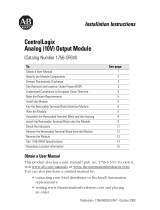 Allen-Bradley ControlLogix 1756-OF6VI Installation Instructions Manual
Allen-Bradley ControlLogix 1756-OF6VI Installation Instructions Manual
-
Allen-Bradley ControlLogix 1756-IC16 Installation Instructions Manual
-
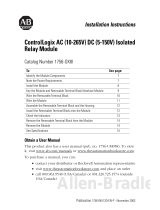 Allen-Bradley ControlLogix 1756-OX8I Installation Instructions Manual
Allen-Bradley ControlLogix 1756-OX8I Installation Instructions Manual
-
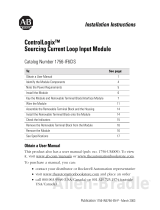 Allen-Bradley ControlLogix 1756-IF6CIS Installation Instructions Manual
Allen-Bradley ControlLogix 1756-IF6CIS Installation Instructions Manual
-
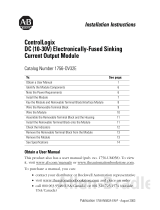 Allen-Bradley ControlLogix 1756-OV32E Installation Instructions Manual
Allen-Bradley ControlLogix 1756-OV32E Installation Instructions Manual
-
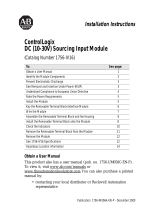 Allen-Bradley ControlLogix 1756-IB16D Installation Instructions Manual
Allen-Bradley ControlLogix 1756-IB16D Installation Instructions Manual
-
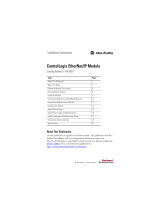 Allen-Bradley ControlLogix 1756-EN2F Installation Instructions Manual
Allen-Bradley ControlLogix 1756-EN2F Installation Instructions Manual
-
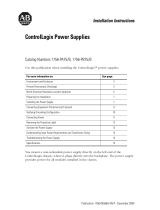 Allen-Bradley ControlLogix 1756-PA75/B Installation Instructions Manual
Allen-Bradley ControlLogix 1756-PA75/B Installation Instructions Manual
-
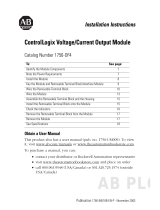 Allen-Bradley ControlLogix 1756-OF4 Installation Instructions Manual
Allen-Bradley ControlLogix 1756-OF4 Installation Instructions Manual
-
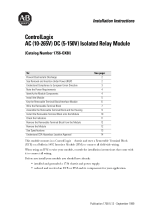 Allen-Bradley ControlLogix 1756-OX8I Installation Instructions Manual
Allen-Bradley ControlLogix 1756-OX8I Installation Instructions Manual
Autres documents
-
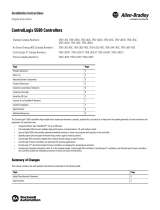 Allen Bradley Allen-Bradley ControlLogix 5580 Controllers Modern Control System Manuel utilisateur
Allen Bradley Allen-Bradley ControlLogix 5580 Controllers Modern Control System Manuel utilisateur
-
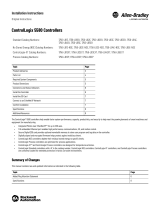 Allen Bradley Allen-Bradley 5580 ControlLogix Controllers Mode d'emploi
Allen Bradley Allen-Bradley 5580 ControlLogix Controllers Mode d'emploi
-
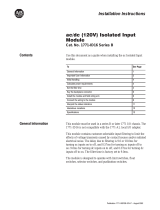 Rockwell Automation 1771-ID16 Installation Instructions Manual
Rockwell Automation 1771-ID16 Installation Instructions Manual
-
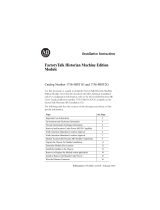 Rockwell Automation Allen-Bradley 1756-HIST2G Installation Instructions Manual
Rockwell Automation Allen-Bradley 1756-HIST2G Installation Instructions Manual




























